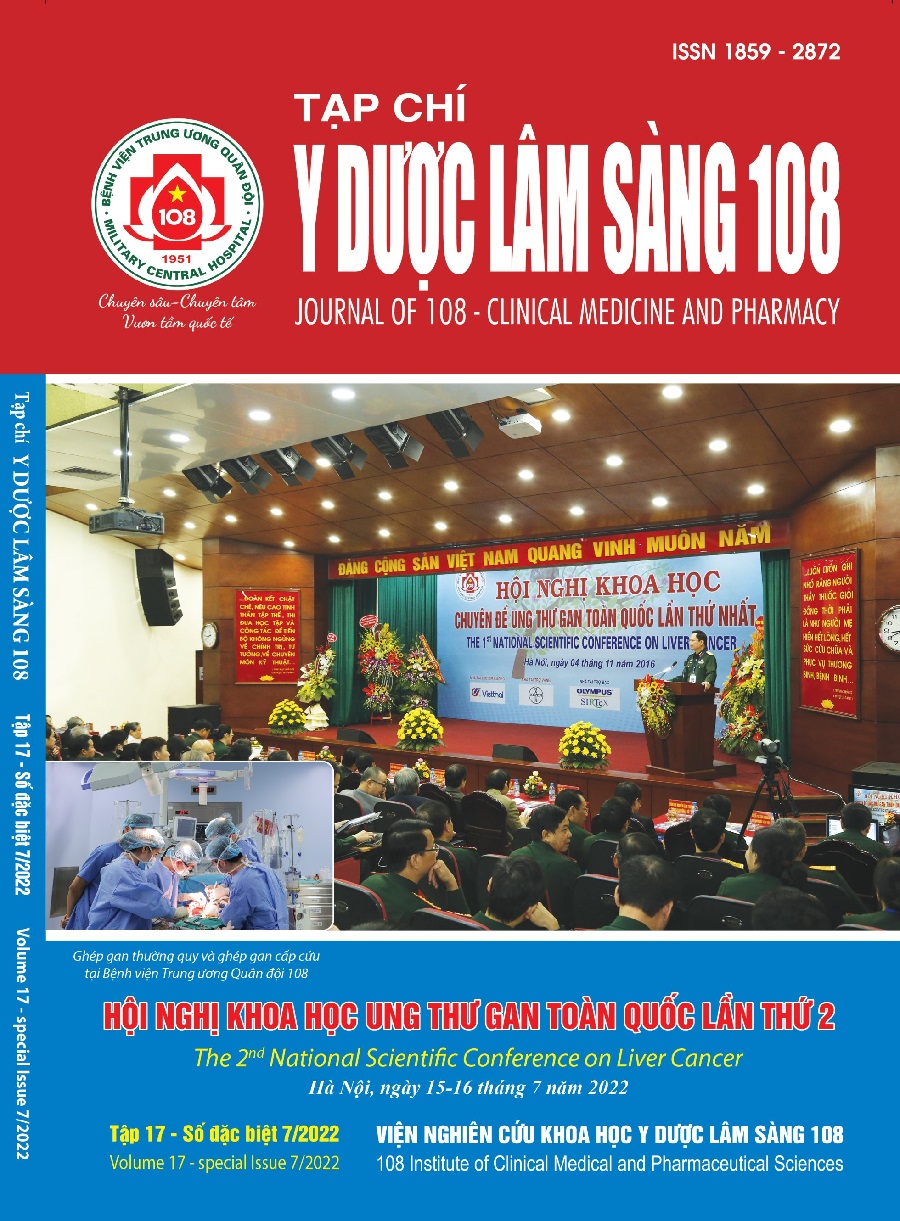Overview: Applications of nanomaterial-based treatment for hepatocellular carcinoma
Main Article Content
Keywords
Hepatocellular carcinoma, nanoparticles, biological materials, treatment
Abstract
Hepatocellular carcinoma (HCC) is the fifth commonly diagnosed cancer and the second leading cause of death in the world. Despite many advances in the treatment of HCC, there are some limitations especially for terminal ill patients. This report comprehensively evaluates the application of nanoparticles for treatment and shows its versatility, which can be considered as a smart tool in the treatment of this complex disease. This review also emphasize the effectiveness in the application of different nanoparticles in the treatment and support of HCC in vitro and in vivo and understanding the role of nanoparticles and develop a new therapy in HCC treatment.
Article Details
References
1. Jadlowiec CC, Taner T (2016) Liver transplantation: Current status and challenges. World J Gastroenterol 22: 4438-4445.
2. Menahem B, Lubrano J, Duvoux C et al (2017) Liver transplantation versus liver resection for hepatocellular carcinoma in intention to treat: An attempt to perform an ideal meta-analysis. Liver Transpl 23: 836-844.
3. Chew SA, Moscato S, George S, Azimi B, Danti S (2019) Liver cancer: Current and future trends using biomaterials. Cancers (Basel) 11(12): 2026.
4. Baig B, Halim SA, Farrukh A, Greish Y, Amin A (2019) Current status of nanomaterial-based treatment for hepatocellular carcinoma. Biomed. Pharmacother 116: 108852.
5. Zhang Y, Wan Y, Liao Y, Hu Y et al (2020) Janus γ-Fe2O3/SiO2-based nanotheranostics for dual-modal imaging and enhanced synergistic cancer starvation/chemodynamic therapy. Science Bulletin 65: 564–572.
6. Wang X, Low XC, Hou W et al (2014) Epirubicin-adsorbed nanodiamonds kill chemoresistant hepatic cancer stem cells. ACS Nano 8: 12151-12166.
7. Gu M, Toh TB, Hooi L, Lim JJ et al (2019) Nanodiamond-mediated delivery of a G9a inhibitor for hepatocellular carcinoma therapy. ACS Appl. Mater. Interfaces 11(49): 45427-45441.
8. Kumar P, Singh AK, Raj V et al (2018) Poly(lactic-co-glycolic acid)-loaded nanoparticles of betulinic acid for improved treatment of hepatic cancer: Characterization, in vitro and in vivo evaluations. Int J Nanomedicine 13: 975-990.
9. Ma X, Cheng Z, Jin Y, Liang X et al (2014) SM5-1-conjugated PLA nanoparticles loaded with 5-fluorouracil for targeted hepatocellular carcinoma imaging and therapy. Biomaterials 35: 2878-2889.
10. Zhang C, An T, Wang D, Wan G et al (2016) Stepwise pH-responsive nanoparticles containing charge-reversible pullulan-based shells and poly(beta-amino ester)/poly(lactic-co-glycolic acid) cores as carriers of anticancer drugs for combination therapy on hepatocellular carcinoma. J. Control. Release 226: 193-204.
11. Liu Y, Li L, Li L, Zhou Z et al (2018) Programmed drug delivery system based on optimized “size decrease and hydrophilicity/hydrophobicity transformation” for enhanced hepatocellular carcinoma therapy of doxorubicin. Nanomedicine 14: 1111-1122.
12. Hanes J, Sills A, Zhao Z, Suh KW et al (2001) Controlled local delivery of interleukin-2 by biodegradable polymers protects animals from experimental brain tumors and liver tumors. Pharm. Res 18: 899-906.
13. Xu Y, Wen Z, Xu Z (2009) Chitosan nanoparticles inhibit the growth of human hepatocellular carcinoma xenografts through an antiangiogenic mechanism. Anticancer. Res. 29: 5103-5109.
14. Qi L, Xu Z, Chen M (2007) In vitro and in vivo suppression of hepatocellular carcinoma growth by chitosan nanoparticles. Eur. J. Cancer 43: 184-193.
15. Xue WJ, Feng Y, Wang F, Guo YB et al (2016) Asialoglycoprotein receptor-magnetic dual targeting nanoparticles for delivery of RASSF1A to hepatocellular carcinoma. Sci. Rep. 6: 22149.
2. Menahem B, Lubrano J, Duvoux C et al (2017) Liver transplantation versus liver resection for hepatocellular carcinoma in intention to treat: An attempt to perform an ideal meta-analysis. Liver Transpl 23: 836-844.
3. Chew SA, Moscato S, George S, Azimi B, Danti S (2019) Liver cancer: Current and future trends using biomaterials. Cancers (Basel) 11(12): 2026.
4. Baig B, Halim SA, Farrukh A, Greish Y, Amin A (2019) Current status of nanomaterial-based treatment for hepatocellular carcinoma. Biomed. Pharmacother 116: 108852.
5. Zhang Y, Wan Y, Liao Y, Hu Y et al (2020) Janus γ-Fe2O3/SiO2-based nanotheranostics for dual-modal imaging and enhanced synergistic cancer starvation/chemodynamic therapy. Science Bulletin 65: 564–572.
6. Wang X, Low XC, Hou W et al (2014) Epirubicin-adsorbed nanodiamonds kill chemoresistant hepatic cancer stem cells. ACS Nano 8: 12151-12166.
7. Gu M, Toh TB, Hooi L, Lim JJ et al (2019) Nanodiamond-mediated delivery of a G9a inhibitor for hepatocellular carcinoma therapy. ACS Appl. Mater. Interfaces 11(49): 45427-45441.
8. Kumar P, Singh AK, Raj V et al (2018) Poly(lactic-co-glycolic acid)-loaded nanoparticles of betulinic acid for improved treatment of hepatic cancer: Characterization, in vitro and in vivo evaluations. Int J Nanomedicine 13: 975-990.
9. Ma X, Cheng Z, Jin Y, Liang X et al (2014) SM5-1-conjugated PLA nanoparticles loaded with 5-fluorouracil for targeted hepatocellular carcinoma imaging and therapy. Biomaterials 35: 2878-2889.
10. Zhang C, An T, Wang D, Wan G et al (2016) Stepwise pH-responsive nanoparticles containing charge-reversible pullulan-based shells and poly(beta-amino ester)/poly(lactic-co-glycolic acid) cores as carriers of anticancer drugs for combination therapy on hepatocellular carcinoma. J. Control. Release 226: 193-204.
11. Liu Y, Li L, Li L, Zhou Z et al (2018) Programmed drug delivery system based on optimized “size decrease and hydrophilicity/hydrophobicity transformation” for enhanced hepatocellular carcinoma therapy of doxorubicin. Nanomedicine 14: 1111-1122.
12. Hanes J, Sills A, Zhao Z, Suh KW et al (2001) Controlled local delivery of interleukin-2 by biodegradable polymers protects animals from experimental brain tumors and liver tumors. Pharm. Res 18: 899-906.
13. Xu Y, Wen Z, Xu Z (2009) Chitosan nanoparticles inhibit the growth of human hepatocellular carcinoma xenografts through an antiangiogenic mechanism. Anticancer. Res. 29: 5103-5109.
14. Qi L, Xu Z, Chen M (2007) In vitro and in vivo suppression of hepatocellular carcinoma growth by chitosan nanoparticles. Eur. J. Cancer 43: 184-193.
15. Xue WJ, Feng Y, Wang F, Guo YB et al (2016) Asialoglycoprotein receptor-magnetic dual targeting nanoparticles for delivery of RASSF1A to hepatocellular carcinoma. Sci. Rep. 6: 22149.
 ISSN: 1859 - 2872
ISSN: 1859 - 2872
